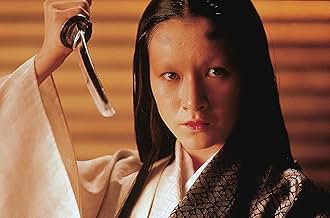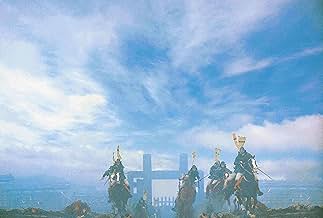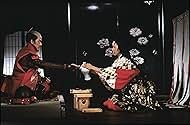En el Japón medieval, un anciano señor feudal decide abdicar y entregar sus dominios a sus tres hijos. Pero no es capaz de ver que estos nuevos poderes los corromperán y harán que acaben enf... Leer todoEn el Japón medieval, un anciano señor feudal decide abdicar y entregar sus dominios a sus tres hijos. Pero no es capaz de ver que estos nuevos poderes los corromperán y harán que acaben enfrentándose los unos a los otros y contra él.En el Japón medieval, un anciano señor feudal decide abdicar y entregar sus dominios a sus tres hijos. Pero no es capaz de ver que estos nuevos poderes los corromperán y harán que acaben enfrentándose los unos a los otros y contra él.
- Dirección
- Guionistas
- Elenco
- Ganó 1 premio Óscar
- 30 premios ganados y 23 nominaciones en total
Mansai Nomura
- Tsurumaru
- (as Takeshi Nomura)
Resumen
Reviewers say 'Ran' is celebrated for its epic scale, masterful direction, and stunning visuals. Adapted from Shakespeare's 'King Lear,' it is lauded for its intricate narrative, powerful performances by Tatsuya Nakadai and Mieko Harada, and deep exploration of power, corruption, and betrayal. The cinematography and battle scenes are noted for their grandeur. Some find its slow pace and long runtime challenging, yet it is often hailed as one of Kurosawa's finest works.
Opiniones destacadas
Akira Kurosawa's 1985, Ran, is based one of Shakespeare's greatest works, King's Lear. The Film proudly stands along with his other classic such as Seven Samurai, Yojimbo, Roshomon, Sanjuro and the Hidden Fortress. He is a master in the art of filmmaking, no one can film an epic battle scene quite like Kurosawa. This is recognized as the most expensive film ever made by Akira Kurosawa, it was at that time, Japan's most expensive film ever. Being at the age of 75, he still showed us, he's one of the best in the business.
This movie is about an aging lord, head of the Ichimonji family, decides to retire and to pass the power to Taro, the eldest of his three sons. He will however have to banish Saburo, the youngest one, who dared to speak the truth to him. Soon, the former lord is chased away from the castles of his sons and becomes mad when he understands that one of his sons is trying to kill him. The three brothers are fighting for control of the Kingdom, as their lust for power grows every day. Four armies are facing each other on the prairie. Lord Ichimonji's former peaceful kingdom is nothing but a distant memory.
Akira Kurosawa redefines what an epic film is, with astonishing story telling, entirely believable characters and real life battle scenes without the use of Special effects/CGI. He retells the story of King Lear in his own way and no one would recognize that it was actually a adaptation beforehand. But just like Shakespeare, there is humor, irony, death and not a happy ending. Everyone who played a part in the production of this film, deserves some kind of recognition. The acting is pretty much excellent and certainly believable.
10/10 Kurosawa is a Genius
This movie is about an aging lord, head of the Ichimonji family, decides to retire and to pass the power to Taro, the eldest of his three sons. He will however have to banish Saburo, the youngest one, who dared to speak the truth to him. Soon, the former lord is chased away from the castles of his sons and becomes mad when he understands that one of his sons is trying to kill him. The three brothers are fighting for control of the Kingdom, as their lust for power grows every day. Four armies are facing each other on the prairie. Lord Ichimonji's former peaceful kingdom is nothing but a distant memory.
Akira Kurosawa redefines what an epic film is, with astonishing story telling, entirely believable characters and real life battle scenes without the use of Special effects/CGI. He retells the story of King Lear in his own way and no one would recognize that it was actually a adaptation beforehand. But just like Shakespeare, there is humor, irony, death and not a happy ending. Everyone who played a part in the production of this film, deserves some kind of recognition. The acting is pretty much excellent and certainly believable.
10/10 Kurosawa is a Genius
Thankee kindly.
Kurosawa, while a great director, isn't somebody whose films I blindly endorse.
However, Ran takes the cake. It easily makes my personal top five films any time I think about it.
The imagery is absolutely stunning, and the dialogue is quite clever. The battle scenes are suitably horrific, and the humor (and yes, there is humor) is subtle enough not to get in the way.
All told, one of the greatest films it's been my privilege to see. I watched it to get the nightmare that was Cold Mountain out of my head, as proof that long movies can actually be epic, as opposed to boring, trite, and predictable.
Kurosawa, while a great director, isn't somebody whose films I blindly endorse.
However, Ran takes the cake. It easily makes my personal top five films any time I think about it.
The imagery is absolutely stunning, and the dialogue is quite clever. The battle scenes are suitably horrific, and the humor (and yes, there is humor) is subtle enough not to get in the way.
All told, one of the greatest films it's been my privilege to see. I watched it to get the nightmare that was Cold Mountain out of my head, as proof that long movies can actually be epic, as opposed to boring, trite, and predictable.
'Ran' is the Japanese word for chaos, riot, dissension. Akira Kurosawa's masterpiece is indeed a feast of destruction and perdition, charged with symbols and powerful in pictures like it is found very rarely in today's cinema.
The dusky story is based on Shakespeare's 'King Lear'. In the film a Japanese warlord celebrates his own downfall. Kurosawa devised this with a radical film language which works with certain imageries of colors, rapid cut sequences and a sophisticated sound design. When the colorful flags of the different armies get intermixed in a battle, when the peacefully quiet wind (which carries the soundtrack) swells to a raving storm or when long wide shots suddenly segue into shots of details that follow hot on each other's heels then you realize Kurosawa's incredible style which deeply influenced the cinema worldwide.
The drawings of the characters are equally terrific. Hidetora's jester is for a certain reason always at the side of the warlord. Their relationship alters as the film continues: Jester and warlord change their roles which makes it hard to distinguish both. Just as the sky turns from blue to grey with dark clouds, the violent past of Hidetora is catching up the aging lord. His trail of murder and predation is not forgotten, the brutally conquered land still carries the old scarves of war and exploitation which now burst out again.
The viewer can take this monumental work as a warning to the destructive power of war, which is even decades later at present and beset those who seed the violence.
The dusky story is based on Shakespeare's 'King Lear'. In the film a Japanese warlord celebrates his own downfall. Kurosawa devised this with a radical film language which works with certain imageries of colors, rapid cut sequences and a sophisticated sound design. When the colorful flags of the different armies get intermixed in a battle, when the peacefully quiet wind (which carries the soundtrack) swells to a raving storm or when long wide shots suddenly segue into shots of details that follow hot on each other's heels then you realize Kurosawa's incredible style which deeply influenced the cinema worldwide.
The drawings of the characters are equally terrific. Hidetora's jester is for a certain reason always at the side of the warlord. Their relationship alters as the film continues: Jester and warlord change their roles which makes it hard to distinguish both. Just as the sky turns from blue to grey with dark clouds, the violent past of Hidetora is catching up the aging lord. His trail of murder and predation is not forgotten, the brutally conquered land still carries the old scarves of war and exploitation which now burst out again.
The viewer can take this monumental work as a warning to the destructive power of war, which is even decades later at present and beset those who seed the violence.
Ran takes viewers to a place they would rather not explore on their own. In a world of cruelty, Kurasowa has shown how the moments within the horror can have beauty. Shakespeare wrote King Lear as a mirror on the human condition. We do not have to be kings and princesses to identify with the father's desire for the well being of his children, even if his own life was one of cruelty and pain. We see this theme throughout great literature and film. What Ran has done is to provide the viewer with many small moments within the pain to realize the beauty. Even the moment of epiphany for Hidetora, when his actions achieve his madness, is one of surpassing beauty. As the storm rages outside the small house of the prince he blinded, whose parents he killed, whose sister he forcibly married off, the simple sounds of the flute provide an intense focus on the here and now. It is at this moment when Hidetora recognizes that he himself sowed the seeds of his own destruction. There is no dialogue, no swashbuckling, just the terrible beauty of the music. As with many of Kurasowa's films, despite their epic scope, it is the small paint strokes that make up the master's canvas.
The 'Kurosawa' adaptation of King Lear in his film 'Ran' is a tremendous memorable film.
It is a very dramatic film with many soliloquies and dialogue, but if you are patient with it, you are treated to some of the most epic scenes of cinematic brilliance that Kurosawa made. After all it is Shakespeare and one must be patient with it if they are not a fan of the old school theatre.
Colourfull clashing armies, The lord awaiting his fate in a burning castle, a brilliant execution scene (I consider the BEST I have ever seen film ever), and the blind being left in the hands of Buddha?
While Seven Samurai will always be his perfection, Ran is more than an enjoyable movie that should be seen. Just stick with it and you'll never forget it.
Rating 9 out of 10.
It is a very dramatic film with many soliloquies and dialogue, but if you are patient with it, you are treated to some of the most epic scenes of cinematic brilliance that Kurosawa made. After all it is Shakespeare and one must be patient with it if they are not a fan of the old school theatre.
Colourfull clashing armies, The lord awaiting his fate in a burning castle, a brilliant execution scene (I consider the BEST I have ever seen film ever), and the blind being left in the hands of Buddha?
While Seven Samurai will always be his perfection, Ran is more than an enjoyable movie that should be seen. Just stick with it and you'll never forget it.
Rating 9 out of 10.
¿Sabías que…?
- TriviaAkira Kurosawa's wife of 39 years, Yôko Yaguchi, died during the production of this film. Kurosawa halted filming for just one day to mourn before resuming work on the picture.
- ErroresDuring the battle at the third castle, there is a sequence where Hidetora emerges from the castle at the top of a flight of stairs and confronts enemy soldiers ascending the stairs. When he retreats, his bodyguards suddenly appear and retreat with him, even though they were not present moments earlier.
- ConexionesFeatured in A.K. (1985)
Selecciones populares
Inicia sesión para calificar y agrega a la lista de videos para obtener recomendaciones personalizadas
Detalles
Taquilla
- Presupuesto
- USD 11,500,000 (estimado)
- Total en EE. UU. y Canadá
- USD 4,314,927
- Fin de semana de estreno en EE. UU. y Canadá
- USD 3,567
- 2 jul 2000
- Total a nivel mundial
- USD 4,388,416
- Tiempo de ejecución
- 2h 40min(160 min)
- Color
- Relación de aspecto
- 1.85 : 1
Contribuir a esta página
Sugiere una edición o agrega el contenido que falta



































